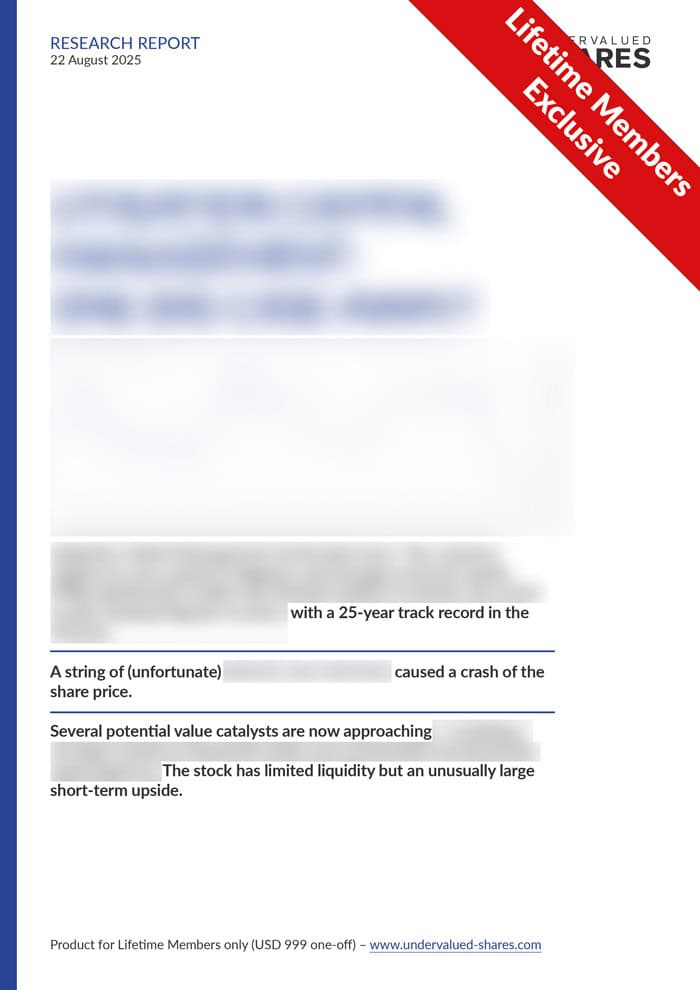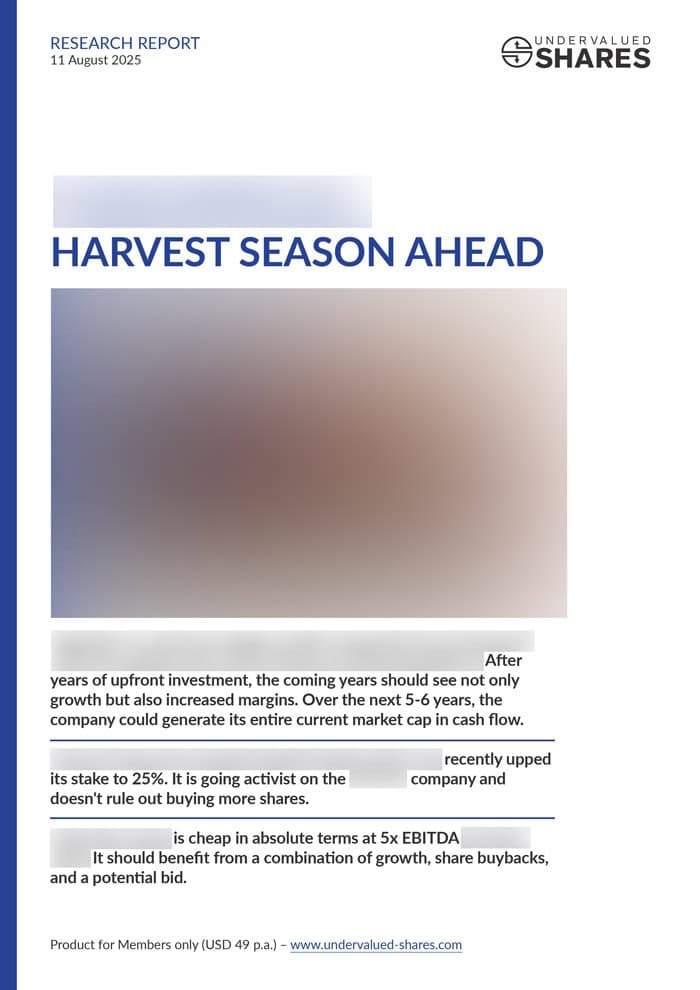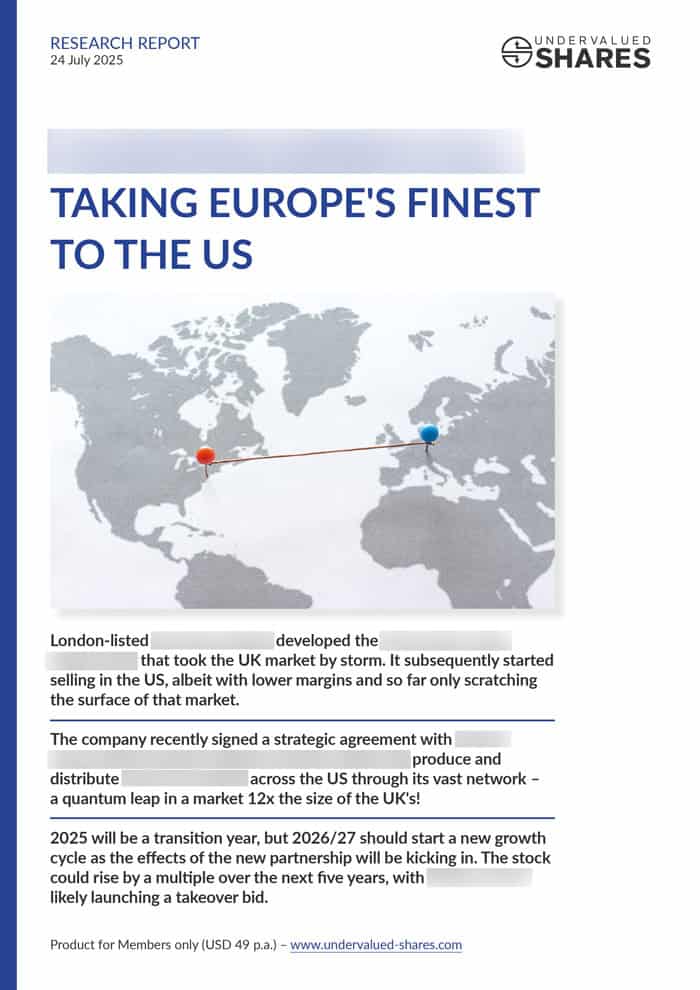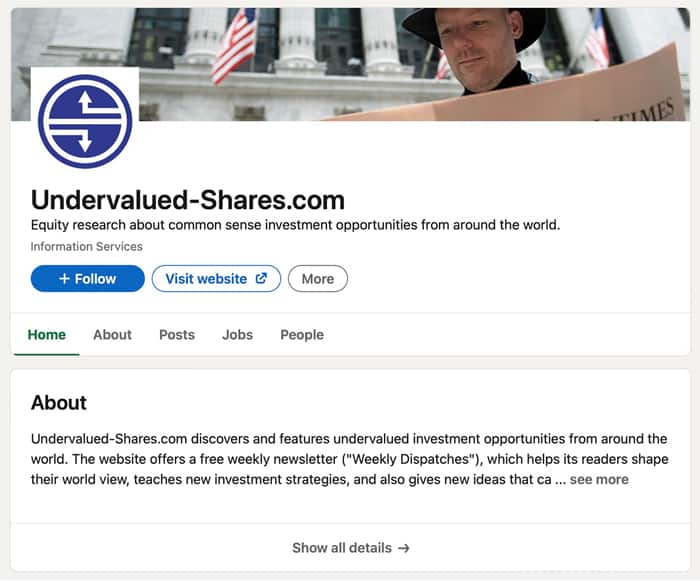Seaport Entertainment Group is a NYSE-listed play on the revival of New York’s southern tip. I visited the neighbourhood to evaluate the opportunity.
11 highlights from our dinner with Kuppy
Harris Kupperman is a hedge fund manager based out of Puerto Rico. Since inception in 2019, his fund has returned 658.57% net of fees as of the end of June 2023.
"Kuppy", as he is also known, is always happy to share his experience and insights.
Undervalued-Shares.com managed to secure Kuppy as a speaker for a dinner in London, with unprecedented interest from readers: with 40 participants, the usual dinner venue got maxed out.
For the 99.9% of Undervalued-Shares.com readers who didn't attend in person, here are some of the highlights of the evening's Q&A session. Kuppy's answers are slightly paraphrased, and none of them are investment advice but Kuppy's personal opinions.

Q: From listening to your videos, Kuppy, it feels like your preferred portfolio would be a massive allocation to physical uranium. What is your plan and thought process for when to sell your physical uranium holdings?
A: I am going to sell when the supply and demand go one of two ways.
One way is the price goes up, then we will sell because I was proven right.
The other way is a bunch of new mines comes online, and it turns out I was wrong.
I am tracking the mines that are coming online, and I am tracking demand numbers. There is a deficit that is basically funded through depleting warehouse stocks. Eventually, you will have drawn the inventories down, and hopefully the thesis works.
And if, along the way, something changes the supply-demand balances, I hope we would see it in real time and adjust our position.
Right now, there are pretty large deficits. As far as I can tell, the deficits are actually expanding. I am just watching it, but if the facts change, we'll get out of it.
About a quarter of my book right now is specifically uranium, and it is our largest exposure.
Q: Do you have an eventual 'dream price', an eventual target price for uranium?
A: I think if it gets to 'escape velocity', which is above USD 65, I genuinely think the price will go to at least a few hundred, potentially a few thousand.
I think it's like GameStop (ISIN US36467W1099, NYSE:GME), due to the massive functional short interest amongst utilities, the deficits and the likelihood that retail gets involved and front-runs the utilities.
I believe that retail will be part of the market in uranium. And if it was not retail, it would be family offices. It is very easy to set up a custody account and buy a few million pounds.
Everyone knows the utility companies are functionally short. They need a couple hundred million pounds just to get their inventories back to historical levels.
I have never seen a commodity with this kind of deficit. When the price starts to "work", everyone will pile in and front-run the utilities.
Q: You've got several 'core bets', such as uranium, oil and oil services, Florida real estate, and local newspapers. If you were forced to sell a single one of these core bets, which one would you sell and why?
A: I love them all!
I'd probably choose the newspapers, because they are probably the least imminent. I genuinely think uranium is imminent. I think offshore is actually happening. My other choice, Florida, is just booming.
In the case of the newspapers, their digital business is growing like a weed, but print is declining a little faster than I thought it would. It is costing them more to do digital than I thought it would cost, and it is creating less value than I expected.
I don't want to say we were wrong, it is actually working. It is just working differently and taking longer.
Q: What are investors' biggest blind spots?
A: I think most people right now don't believe that interest rates can go up. I wrote a blog post about it.
One great thing about having over 20,000 readers on my blog is that I get a lot of feedback. Sometimes, when I write something, it's like I smacked a hornet's nest, and everyone writes back. Many of these replies are really eloquent and detailed.
I said some things about COVID that really upset people. Looking forward two years later, I have been proven right. That was the last time that the world erupted and hated me. Now, suddenly the world hates me because I think that ten-year bonds can decline from here and rates can get to 6%.
People have been in this weird ZIRP world for 40 years, where rates are on a trend down, and they just do not understand that we will not return to this world.
You look at the chart, interest rates are about to break out. When you have a breakout, then usually the next move is the same amplitude of the last move.
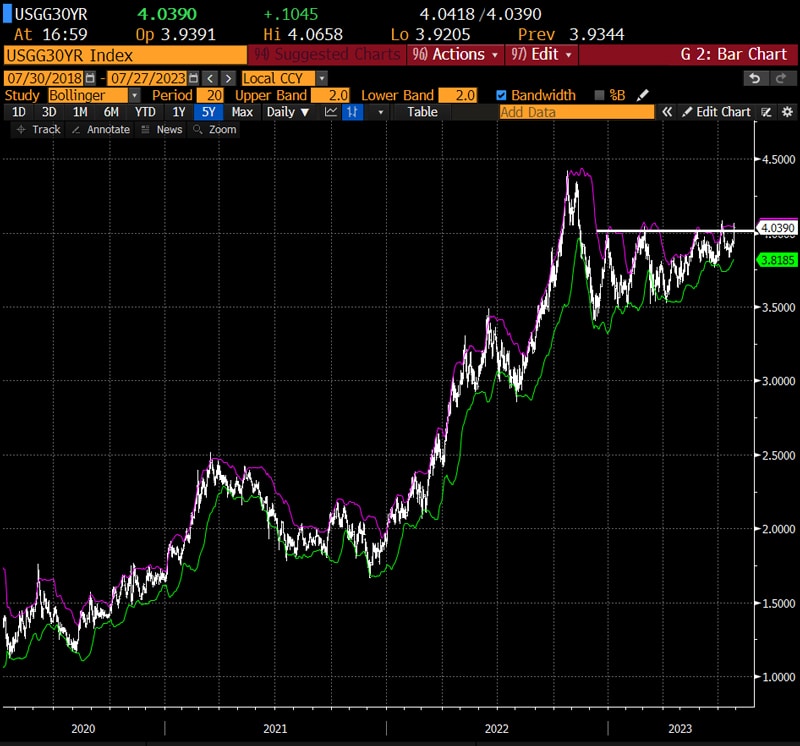
United States 30-Year Bond Yield.
Q: Why do you think inflation is structural?
A: All the previous drivers of disinflation are now in reverse. Globalisation is in retreat, the labour pool is shrinking, and governments handing out stimuli is popular.
We could grow our way out of our national debt, but Western governments hate economic growth. So, we can only default through debasement and money printing.
I like what Israel once did, where they had 100% inflation for three years and then froze everything. It led to a bad recession, but then they could start anew with low debt. I don't see the political will for that in the Western democracies.
Q: If you were investing solely your own money instead of via a hedge fund vehicle, would your investment style change at all?
A: I'd probably be more concentrated on the stuff I really love.
I feel like we spend about 90% of our energy on 20% of the portfolio. However, as a fund, you simply cannot own just five stocks. Even if they really are the best.
Q: Who is your investor hero?
A: I really appreciate Bob Robotti. He is someone who doesn't get enough appreciation and attention. Bob consolidates industries, he has done this in multiple industries and sectors over the past 50 years. He has done this in the cyclical industries where he buys at the bottom when everyone is about to go bankrupt.
Robotti puts a bunch of semi-bankrupt companies together, they get synergies, and that industry goes from ten players to three or four. Margins go up, and the Return on Invested Capital goes crazy. He is not like everyone you see on CNBC: "Oh, I am going to buy this thing and sell this other thing." Robotti has a plan, and he sticks to the plan. He invests with a multi-year timeline.
Hardly anyone even knows of him because nowadays it's mostly his own money and he isn't out there marketing all day. He runs a concentrated portfolio, and he's had plenty of volatility along the way. Between 2014 and 2019, his names suffered. However, even with that, he's still had amazing long-term compound annual returns. He does things differently from most investors, and it works.
Q: How do you generate new investment ideas?
A: We mostly look around and check on what government has done this week that is really stupid. Politicians always pursue short-term actions because they have to win elections. This creates a lot of opportunity for investing as they don't care about effects that happen beyond the election – they only care about winning the election.
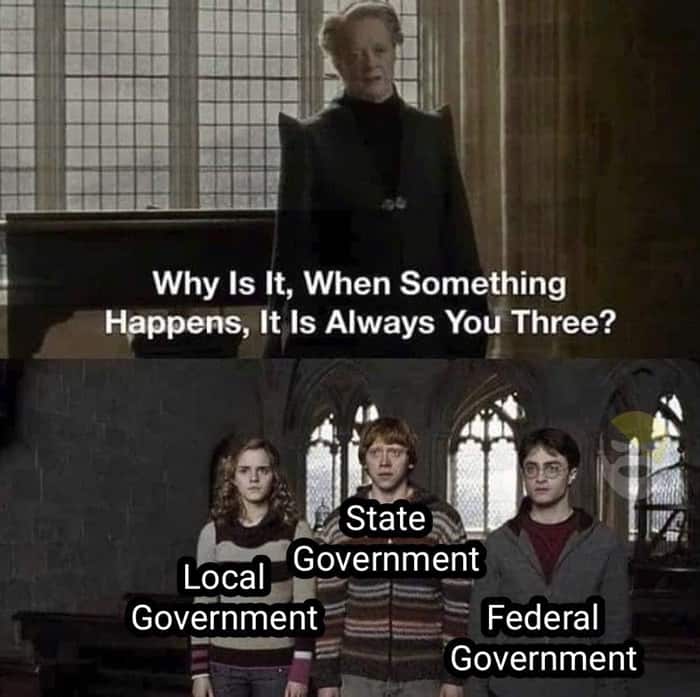
Q: Who is your favourite author?
A: That's definitely Jim Rogers. "Investment Biker" is the classic that everyone should read first, but his subsequent books are just as entertaining and insightful.
I also really like the late Sam Zell. I never met a funnier man in my life. He always bought what everyone hated. You may think his media appearances were outrageous, but his media personality was actually toned down. He wrote a book: "Am I being too subtle?".
Q: If you had to recommend a book – a training book – that you would love to read, what would it be?
A: That would be "Tomorrow's Gold".
It's by Marc Faber. I just read it again. I read it all the time. It is really the best book there is.
Everything goes in cycles. You have to learn about cycles, and recognise cycles.
I just live and breathe this book.
Q: What do you like best about our industry?
A: Our industry is truly fascinating. There are simply so many ways how to go about it! You can choose your own idol or create your own adventure.
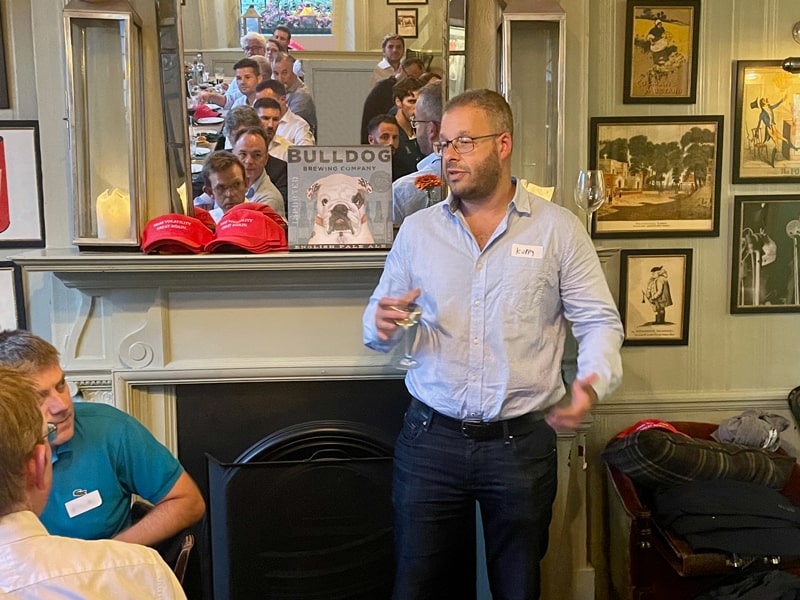
Closing thoughts
Yours truly loved this event for a number of reasons.
Some participants travelled to London from afar. Our group included out-of-towners from Surrey or Yorkshire, but also visitors from Ireland, Austria, Germany, Poland, and Romania. One participant from the US hadn't travelled to London just for this dinner, but he timed his first day in Europe to coincide with the dinner because of the opportunity to meet both Kuppy and myself.
Out of 40 registrations, we had just one no-show on the evening. In a city where event organisers routinely calculate with no-show rates of 30-50%, this is an incredible metric.
Following the 1h Q&A session, most attendees stayed on until the venue started to nudge us to leave the private dining space. A hardcore group of a dozen then decided to have another drink with Kuppy.
For anyone curious to learn more about Kuppy's work, do follow his Twitter account or sign up to his blog.
Can't get enough of Undervalued Shares?
Head over to LinkedIn, and read even more from your favourite investment blog!
It's the youngest member of the Undervalued-Shares.com social family, and still growing.
Watch it evolve, and enjoy short summaries of the Weekly Dispatches, updates on the latest research reports and other news while you do.
Can't get enough of Undervalued Shares?
Head over to LinkedIn, and read even more from your favourite investment blog!
It's the youngest member of the Undervalued-Shares.com social family, and still growing.
Watch it evolve, and enjoy short summaries of the Weekly Dispatches, updates on the latest research reports and other news while you do.
Did you find this article useful and enjoyable? If you want to read my next articles right when they come out, please sign up to my email list.
Share this post:



